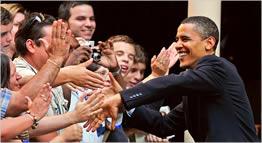
“It used to be a given that you would always take the Federal money and you would stop your fundraising in the general election … President-elect Obama is the first one ever to opt out of that system. You get 84 million dollars, more or less, from the Federal government

The campaign’s use of the internet was partly responsible for Obama’s fundraising success; as it was for targeting the particular demographic that was perhaps most vocal in its support for Obama: younger voters. “The amount of money that was raised because of the internet, and how you could micro-target voters is going to change campaigns,” Okun says.
The internet has been hailed by Arriana Huffington, editor-in-chief of online newspaper The Huffington Post, as the reason why Obama – somebody who Okun says he had not even heard of five years ago in spite of being in politics and government – was able to get the Democratic Party’s presidential nomination and win the election. Obama’s internet campaign, which has been paralleled to John F. Kennedy’s unprecedented television campaign, used virtual tools such as YouTube and Facebook to reach out to, and interact with, supporters and appeal to potential voters, at a fraction of the cost of similar exposure on television.

With the Democratic Party having secured the executive branch of government and both houses of the legislature, Obama is coming in with a mandate that even President Bill Clinton did not manage to achieve, says Okun. He notes that it will be interesting to see how the Democrats govern with these very big majorities.
Managing expectations
Having set new precedents at home, Obama is also dealing with high expectations overseas, especially as he has already built up good rapport with several European leaders. Okun refers to this as the “the honeymoon period that many presidents come in with and Barack Obama, because of who he is, and the fact that he has lived overseas adds even more to that, so there’s a lot of goodwill there. The question is how high are the expectations; and are people going to give this administration the time to meet those.”

Okun does not see the Obama campaign as having been anti-trade, but as having been a “time-out campaign,” placing an emphasis on reassessing what the US government is doing before moving forward.
He stresses that Asian governments also have a role to play in keeping the US government open to increasing trade links. “I think we need to watch what happens in Asia, which is going to dictate partly what happens in Washington … And so if we are faced, as the foreign business community here (in Asia is), with trade barriers being newly erected, it’s very hard for us to educate (the administration) back in Washington that those trade barriers shouldn’t be erected in the US.”
Steve Okun took part in the opening dialogue at the INSEAD Leadership Summit in Asia 2008 with INSEAD Dean Frank Brown.
-
View Comments
-
Leave a Comment


No comments yet.